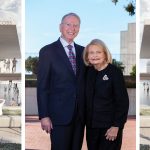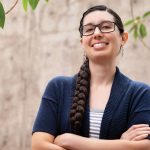In 2015, Salk Professor Reuben Shaw and Professor Nicholas Cosford at Sanford Burnham Prebys (SBP) demonstrated that by chemically blocking the ULK1/2 protein, they could shut down the cellular recycling pathway known as autophagy that some cancer cells use to stay alive. The researchers found small molecule compounds that effectively blocked ULK1/2 and killed cancer cells, including human and mouse lung cancer cells and human pancreatic cancer cells. Now, Salk, along with SBP, has signed an exclusive licensing agreement with Endeavor BioMedicines for an intellectual property portfolio relating to cancer therapeutics and diagnostics that target ULK1/2. Endeavor plans to complete studies and advance the program into the clinic, initially in colorectal and lung cancers, in the next 18 months.
Read News ReleaseCancer
Salk team launches phase 1 clinical trial for Alzheimer’s therapy
In another recent advancement, the investigational Alzheimer’s drug CMS121, developed and studied at Salk over the last 15 years, has now moved into a phase 1 clinical trial to evaluate its safety in humans. Salk Research Professor Pamela Maher and Bill Raschke of Virogenics, Inc., received $4.5 million over two years from the National Institute of Aging to support the trial and expect the first doses to be administered to healthy volunteers in early 2022. In mice, CMS121 reverses signs of aging in the brain and prevents the memory loss associated with Alzheimer’s disease.
Read News ReleaseSalk scientists reveal cancer’s most common gene mutations
Genetic mutations play a fundamental role in the development and growth of cancers. However, while many studies have identified the mutations involved in certain cancers, like breast cancer, no one had ever managed to combine the data in a way that could reveal which mutations are most common in the entire cancer patient population. Now, Assistant Professor Edward Stites and his team of computational scientists have combined gene mutation information with cancer prevalence data to reveal the genetic basis of cancer in patients across the United States. The findings could help guide genetic research to develop more effective treatments than presently available.
Read News ReleaseFeatured Stories
 Joan and Irwin Jacobs — A perfect matchJoan and Irwin Jacobs donate $100 million, a transformative gift, helping to launch Salk’s five-year, $500M philanthropic and scientific Campaign for the Future.
Joan and Irwin Jacobs — A perfect matchJoan and Irwin Jacobs donate $100 million, a transformative gift, helping to launch Salk’s five-year, $500M philanthropic and scientific Campaign for the Future. How computational biology is making us smarterThe Salk Institute is embracing the artificial intelligence revolution and inventing new ways to investigate life. Machine learning, deep learning and other AI techniques are being used to probe massive data sets, identify useful information and make accurate predictions.
How computational biology is making us smarterThe Salk Institute is embracing the artificial intelligence revolution and inventing new ways to investigate life. Machine learning, deep learning and other AI techniques are being used to probe massive data sets, identify useful information and make accurate predictions.  Dan Tierney – Biology Meets TechnologyDan Tierney is no stranger to big data. When Tierney founded a financial technology firm in the late 1990s, long before he joined the Salk Institute’s Board of Trustees, he was fascinated by emerging computational approaches that could crunch data and reveal hidden truths.
Dan Tierney – Biology Meets TechnologyDan Tierney is no stranger to big data. When Tierney founded a financial technology firm in the late 1990s, long before he joined the Salk Institute’s Board of Trustees, he was fascinated by emerging computational approaches that could crunch data and reveal hidden truths.
 Natalie Luhtala — Shaping pancreatic cancer research to have real world applicationsThis year, Staff Scientist Natalie Luhtala celebrates her 10-year work anniversary at the Institute. In her current role, she’s directing a project examining an elusive signaling pathway to identify new targets for treating pancreatic cancer.
Natalie Luhtala — Shaping pancreatic cancer research to have real world applicationsThis year, Staff Scientist Natalie Luhtala celebrates her 10-year work anniversary at the Institute. In her current role, she’s directing a project examining an elusive signaling pathway to identify new targets for treating pancreatic cancer. Laura Newman — From mitochondria to craft beer and backLaura Newman, a Salk postdoctoral researcher, fell in love with science in a lab in college and switched from a medical program to pursuing biochemistry and developmental biology. At Salk, her main focus is on how cells can recognize when they’re sick or damaged in order to activate the immune system for cell survival.
Laura Newman — From mitochondria to craft beer and backLaura Newman, a Salk postdoctoral researcher, fell in love with science in a lab in college and switched from a medical program to pursuing biochemistry and developmental biology. At Salk, her main focus is on how cells can recognize when they’re sick or damaged in order to activate the immune system for cell survival.






















































